There are bad portrayals of women, there are worse portrayals of women, and then there is the ‘Sima aunty gaze‘ on women. This gaze, displayed in Season 2 of Indian Matchmaking on Netflix, is not the female gaze endeavouring to establish equal companionship in couples but is rather the male gaze, as elucidated upon by Laura Mulvey. In ‘Visual Pleasure and Narrative Cinema,’ Mulvey writes, “The determining male gaze projects its phantasy onto the female figure which is styled accordingly. In their traditional exhibitionist role, women are simultaneously looked at and displayed.”
Indian Matchmaking Season 2 was aired on August 10, and throughout the eight episodes, Sima Taparia, a marriage matchmaker from Mumbai earnestly victimises men who are bratty, pompous, and overconfident while at the same time continually criticises women who are confident and focused on not losing their identities in the process of matchmaking.
Not only does the show demean and deride women, but it also demoralises and demonises them. It shows focussed, brilliant women as threatening, incapable of loving or being loved, and also shows clueless, subservient, societally conditioned women as the ones who deserve to get married because they are willing to “compromise“—Sima aunty style.
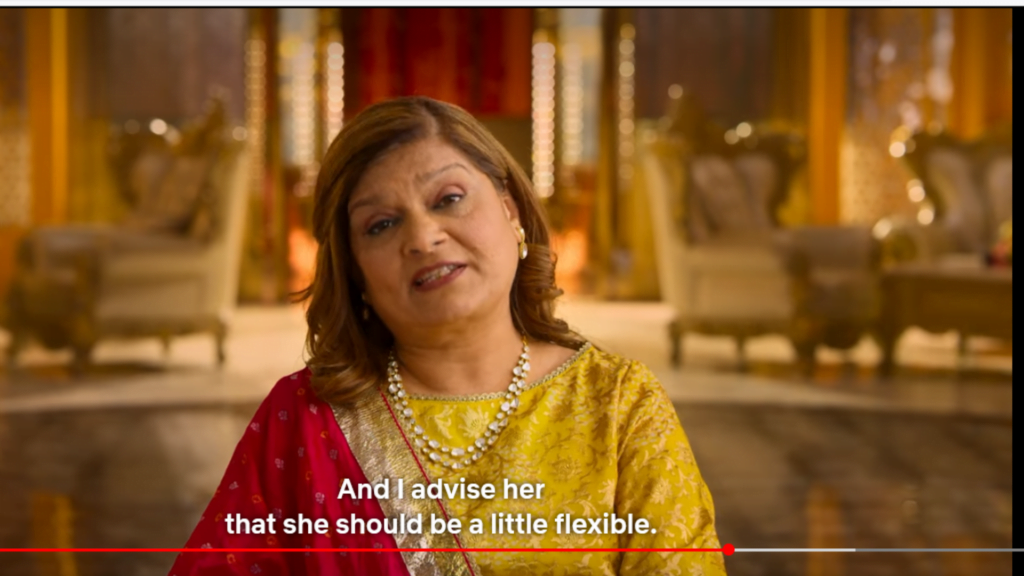
Indian Matchmaking Season 2 was aired on August 10, and throughout the eight episodes, Sima Taparia, a marriage matchmaker from Mumbai earnestly victimises men who are bratty, pompous, and overconfident while at the same time continually criticises women who are confident and focused on not losing their identities in the process of matchmaking
In the first episode of Indian Matchmaking, Akshay Dhumal, who has inherited a family business and not earned his way up the ladder, much like most Indians have to do, boasts, “9.5 on ten. I am the world’s most eligible bachelor right now.” Akshay is 38, is involved in his family business, and in his self-serving, overtly chauvinist manner refers to his past as “I’m a nice guy… I’ve dated a few chicks“, all the while hiding an engagement from the past that he broke off.
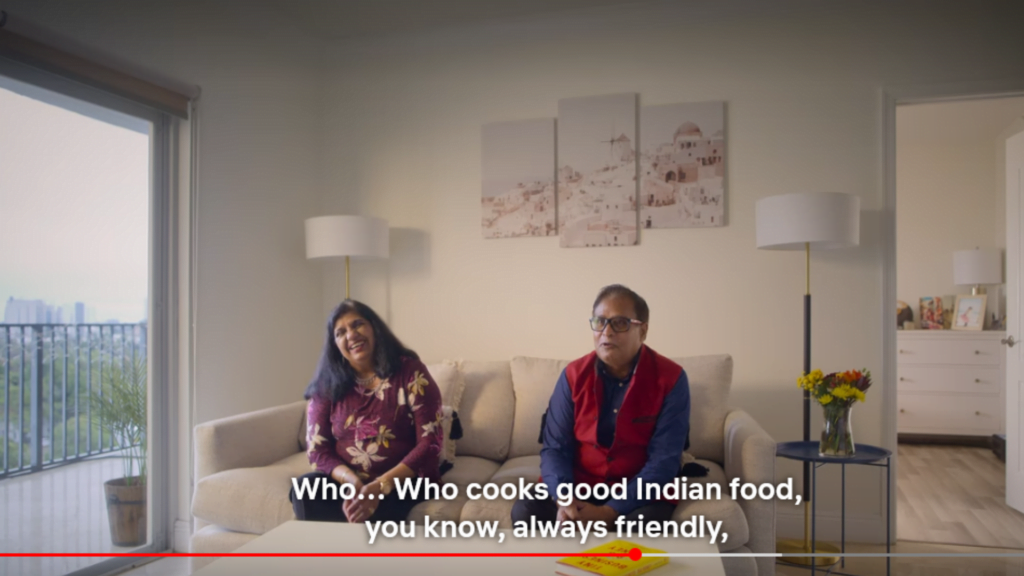
While talking about Akshay, Sima aunty is all praises. She mentions how eligible 38-year-old Akshay is meanwhile demeaning girls who are unwilling to marry him for they would have to shift to Nashik, leaving behind their family, friends, and career prospects, and speaks at length about how she herself had shifted for her husband in the past. Nonetheless, Indian Matchmaking also infantilises Sima when talking about Akshay’s business—patriarchy does not excuse women who uphold it.
For Sima aunty, who flinches the second a woman is in her thirties and has not married yet, or simply wants an equal partner, this lavish praise of Akshay is hypocritical, to say the least. After all, in Sima aunty’s world, men need to be extended obeisance, and any woman depicting deviation should be excommunicated because prospective brides always need to “compromise”, so much so that when in a later episode, Viral states a bare minimum requirement that she wants a man with a stable, cool temperament and wants to take care of parents as an only child, Sima aunty’s reaction accompanied by the background music make Viral sound deranged.
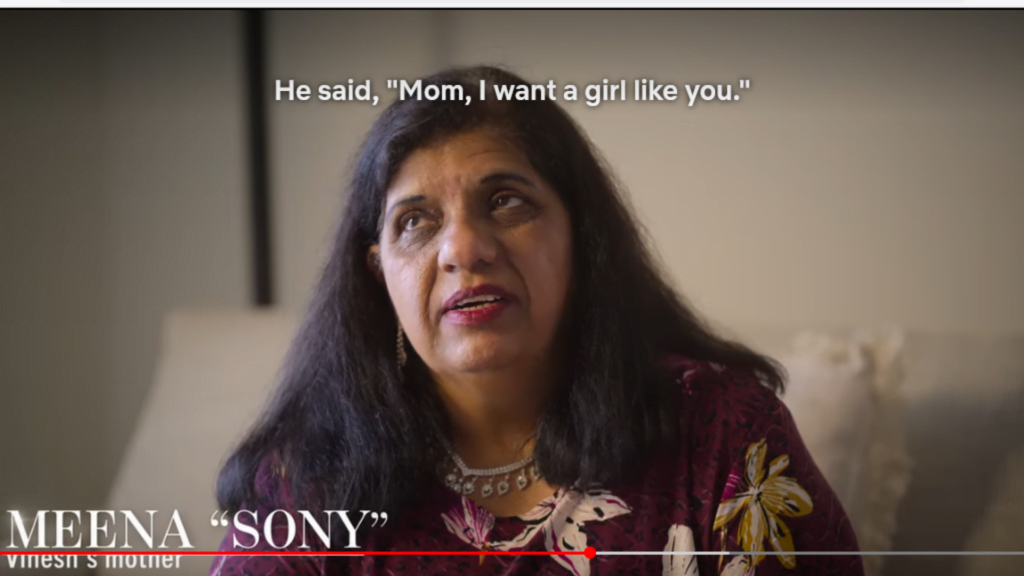
In one line, Akshay states that he is from Nashik, which is an “agricultural state,” and in another, he states his inability to date, or rather his incompetency to commit, stating the reason that he is from Nashik, and “I would get 10-20 matches if I told them I live in Bombay.” He elaborates how “If it was totally up to my parents I think they would choose the kind of person who would give them the most number of babies,” and laughs without any acknowledgement of the choice or consent of his prospective bride.
Akshay mentions how he would like “a boy and a girl or a girl and a boy“, and how he is comfortable with either order, without mentioning the possibility of having two girls, or in fact, gender non-conforming kids. Next, Akshay explains, rather, let’s use this feminist platform to say mansplains that after he went to the United States to get a degree, he had to come back because the “elder son has to take responsibility for the family business. And it would be nice to come home to someone and to start a family.”
The picture is of privilege and patriarchy served on a platter. But if a 38-year-old woman would have stated that she has dated such a considerable number of men, has returned from the States, runs the family business, and wants to come home to someone, Sima aunty would have most probably ostracised her from the marriage business.
Akshay’s family adds to this misogynist marriage setup by stating that the girl needs to have an interest in the family business and be understanding of the day-to-day functions of the factory—obviously, she is expected to fully lose her identity while not once mentioning that they would do the same for her career.
Also read: Indian Matchmaking: Capitalising On The Arranged Marriage Market & Its Anxieties
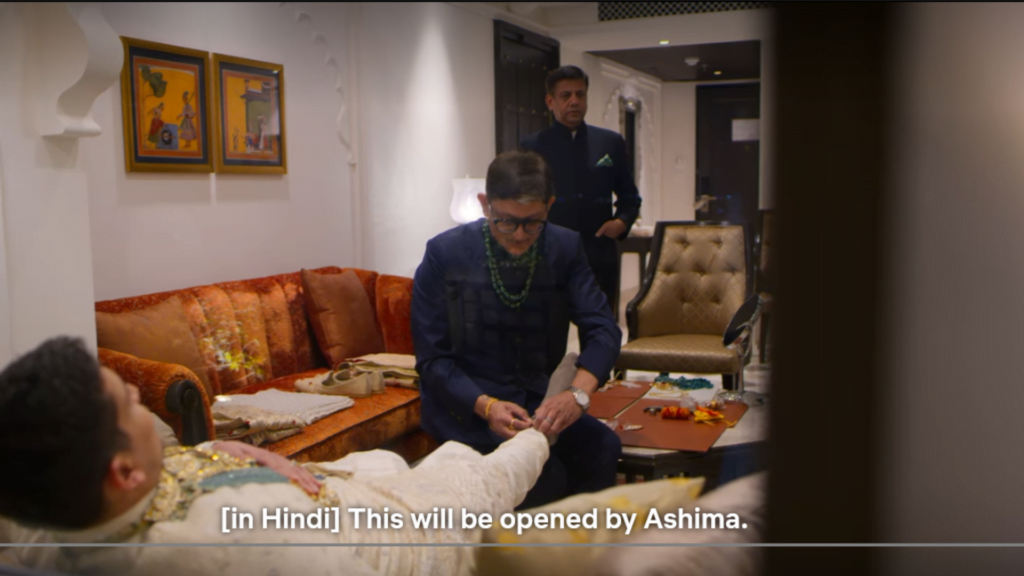
After listing down several patriarchal expectations from a prospective bride, Akshay, and his family state that “willingness to put an equal amount of work in the relationship as your partner” is necessary. Double standards so deep, the Mariana Trench can be measured in a second’s flick.
One striking aspect of Indian Matchmaking is the background music when men speak vs. when women speak. When men demand a bride ready to serve them in all aspects, the music is serious. But if a clear-headed woman asks for an equal man, the background music mocks her continuously, and the camera amplifies the male gaze.
For Sima aunty, who flinches the second a woman is in her thirties and has not married yet, or simply wants an equal partner, this lavish praise of Akshay is hypocritical, to say the least. After all, in Sima aunty’s world, men need to be extended obeisance, and any woman depicting deviation should be excommunicated because prospective brides always need to “compromise”.
If you thought Akshay’s was an exceptional affair which most probably you wouldn’t have, let us reinstate that this is the flavour of the show. The episodes in Indian Matchmaking are titled in the same taste—taunting women and flattering men. The constant springing of superstitious and regressive practices being perpetuated in the show by these highly educated, or so they claim individuals, is disturbing.
In the episode where Mumbai-based jeweller Pradhyuman Maloo gets married to Ashima, his family member ties a thread above his ankle, making 7-8 knots, stating that this would have to be opened by Ashima to determine how smart she is, maintaining that “this is our culture“, as he visibly stands at a physical pedestal during the garland-exchanging ceremony and Ashima bows before garlanding him.
The relationship is all about Pradhyuman’s restaurant, his choices, his friends, and his family and not about the woman’s individual equations or interpersonal traits. Pradhyuman even attempts to decide what ring he will design for Ashima without waiting for her preferences.
During the wedding, Pradhyuman keeps his head erect and raises himself while Ashima bows down, or has been asked to or conditioned to, and so does the class system as one watches the dancers struggling with smoke as the elite revel in enjoyment.
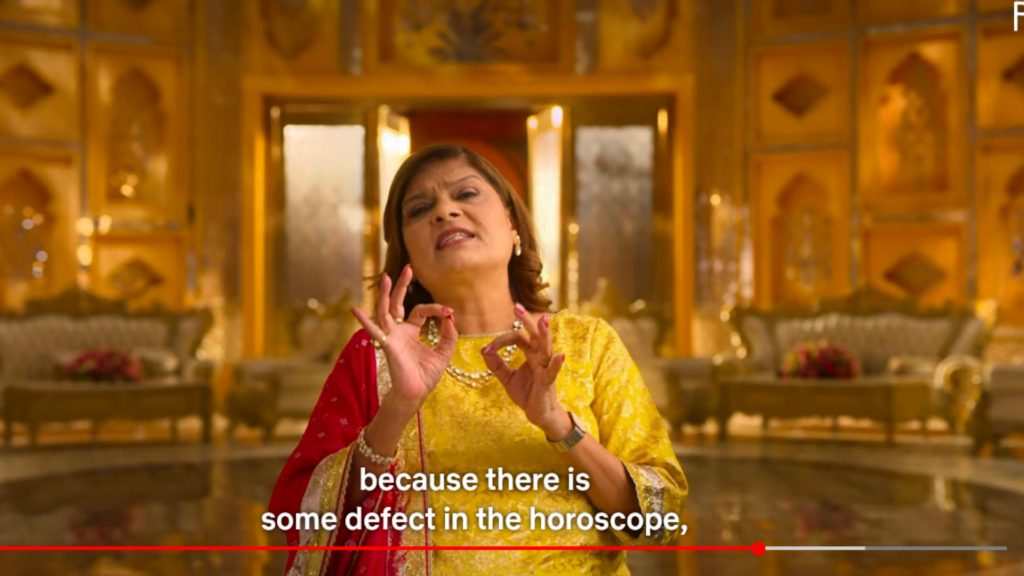
In Are Prisons Obsolete, Angela Davis states, “According to English common law, marriage resulted in a state of ‘civil death’, as symbolised by the wife’s assumption of the husband’s name.” Pradhyuman had seen 100-150 girls before his marriage and his wedding at last, though not arranged by Sima aunty, depicts how women have to be completely “compromising” to get married and change everything about them to settle into their “new homes“. Later in their interview, Ashima defines Pradhyuman by stressing on his interpersonal interests even as Pradhyuman only refers to her as his wife while chaining her surname.
In another episode, Miami resident Vinesh Vasnani enters with his flamboyant, materialistic style and lists out how he would want to “design” the woman of his dreams—a phrase manifesting patriarchal control and desire over the existence of women rather than expecting them to exist bereft of the male gaze. He expectedly mentions physical features catering to his gaze and patriarchal demands, further elucidating that he wants someone who “cooks good Indian food and pakoras like his mother“.
It has always surprised me that men of Indian descent live with their mothers for decades and yet refuse to pick their own plates, let alone the culinary skills of their mothers, but expect a newfound arranged-marriage girl to learn the cooking style of the respective mothers-in-law out of the blue.
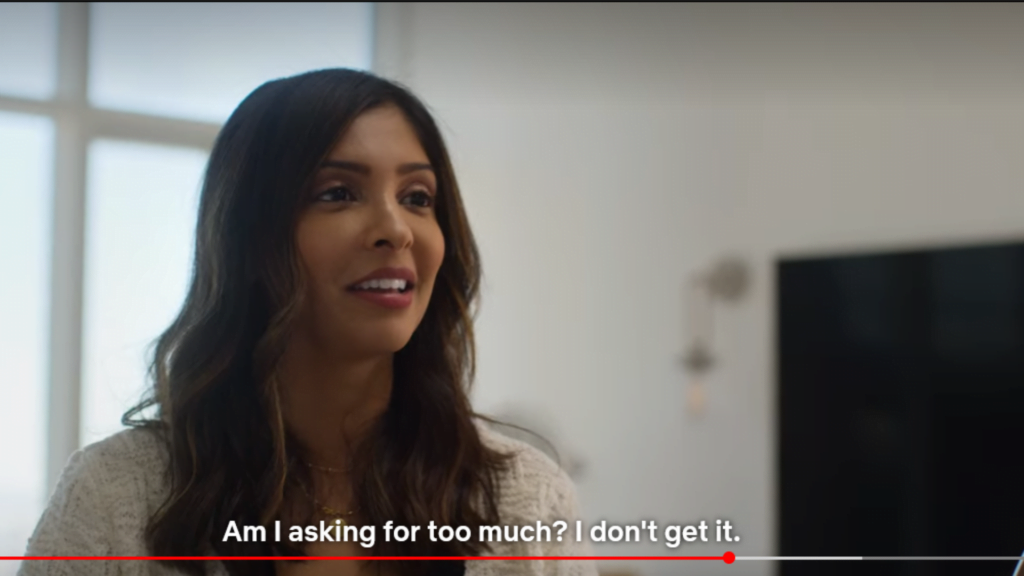
Anyway, Vinesh in Indian Matchmaking wants someone whom he can “take to” a dive bar to eat from a food truck one night and then the next day go to a black-tie affair in a cocktail bar—maybe a mannequin would fulfil his needs since it would be easy to carry and “take” her without her own choices and opinions getting in place.
Sima aunty enters Vinesh’s house and refers to his father as the “Ghar ka mukhiya (head of the house)”—a phrase associated with the patriarchal control of men over their households. Similar to how most men in the show and this society picture the eligibility of women with their ability to “adjust” with the man’s family and in this show—their dogs, Vinesh also does the same and expects her to wear his team’s colours and sit and watch the game next to him.
These men do not ponder whether they can “adjust” enough to fit into the family of their prospective brides. In the episode where the cardiologist Arshneel tries talking about he also getting along with his wife’s family and friends, Sima aunty cuts him off in between.
Vinesh wants a Sindhi girl who is “equally extroverted but also introverted”, who is an “ambitious” woman but is a “traditional Indian girl” so they are, or rather he can “share the same values and traditions”, as his family proclaims their patriarchial happiness in how “she is happy to relocate for the right person” and Sima aunty nods in misogyny.
In the later episodes, we find Vinesh’s sister-in-law bringing in the bowls from the kitchen and asking Vinesh if he would want to “help” her with drinks as if it is her responsibility and men can “choose” to help her or not. No one else offers her “help” or undertakes responsibility for the same. Furthermore, she takes care of her child entirely with other family members, including her husband, enjoying the presence of the child but not even once bothering about taking care of the same. Sima aunty mentions the education and independence of women as problems in getting married, while men are appreciated for the same.
Vinesh’s parents in Indian Matchmaking are quite happy about him wanting a “girl like his mother..who cooks Indian food…always friendly…always family” and feel that they have raised him right without noticing how this erases the possibility of the independent existence of his to-be wife and whether Vinesh would be as giving towards him. They rather look forward to him finding such a girl.
The women, on the other hand, have been conditioned to have such low standards that they feel obliged when a man pulls a chair for them or serves them food on the date, and when complimented for the same, their regional bias exudes where they state they are “from the South“.

The show is so peacefully conservative that amidst all their “very-well educated” stature or affluent exposure, religious minorities such as Muslims or the caste or class-oppressed or dark-skinned women are conveniently excluded from the picture as if they do not exist at all. This behaviour is perpetrated by all, irrespective of gender or regional location. Upper-class women uphold class and caste even as patriarchy oppresses them.
Viral, a North Carolina-based clinical research associate, wants a “self-made man” and then decides that the guy who was sent for schooling abroad in his pre-teens is “self-made” even as one observes aghast the amount of birth-based privilege that the boy would have always had.
Degrees do not alter bigotry, and at times, quite like how Indian Matchmaking portrays, they only reinstate it further without care, consequences, or concern. Additionally, somehow Sima aunty always finds people belonging to the same class, and of course, all these conversations are in rooted the cis-heteronormative family structure with gender binaries thrown in every sentence and upper-caste, upper-class culture of about 1 per cent of the Indian population shown as the by-default Indian culture.
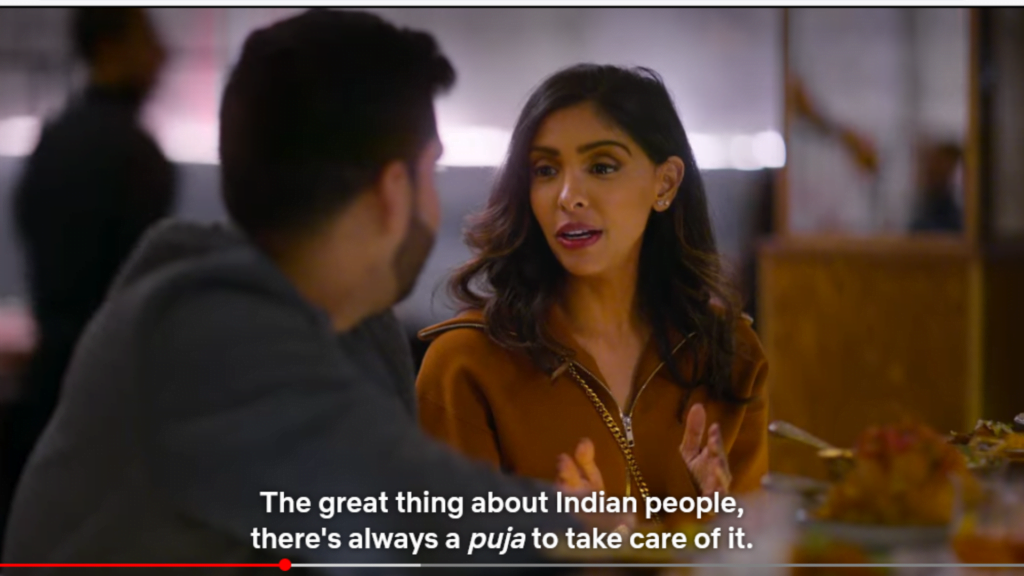
If a woman says that she is not asking for anything that she herself doesn’t bring to the table, the show mocks her, but when a man victimises himself because a woman won’t move and leave everything for him, the show again mocks the woman. Men at 38 are shown as victims, but women who are 34 are shown as villains.
The friends of the men also victimise them, stating that the men have to now suffer, even as patriarchy favours them, and the friends of the women try to strengthen women who have been societally conditioned to adjust, at times even asking them to reconsider and rethink their decisions and demands.
According to an article in the LA Times, no couple set up by Sima aunty married in the first season of Indian Matchmaking, and if this is her “way of working“, we should be glad it is so.
Also read: Panchayat Web Series: A Brahmin Cast And Crew Romanticises A Meritless All-Brahmin Local Government
Featured image source: The Guardian
About the author(s)
Ankita Apurva was born with a pen and a sickle.
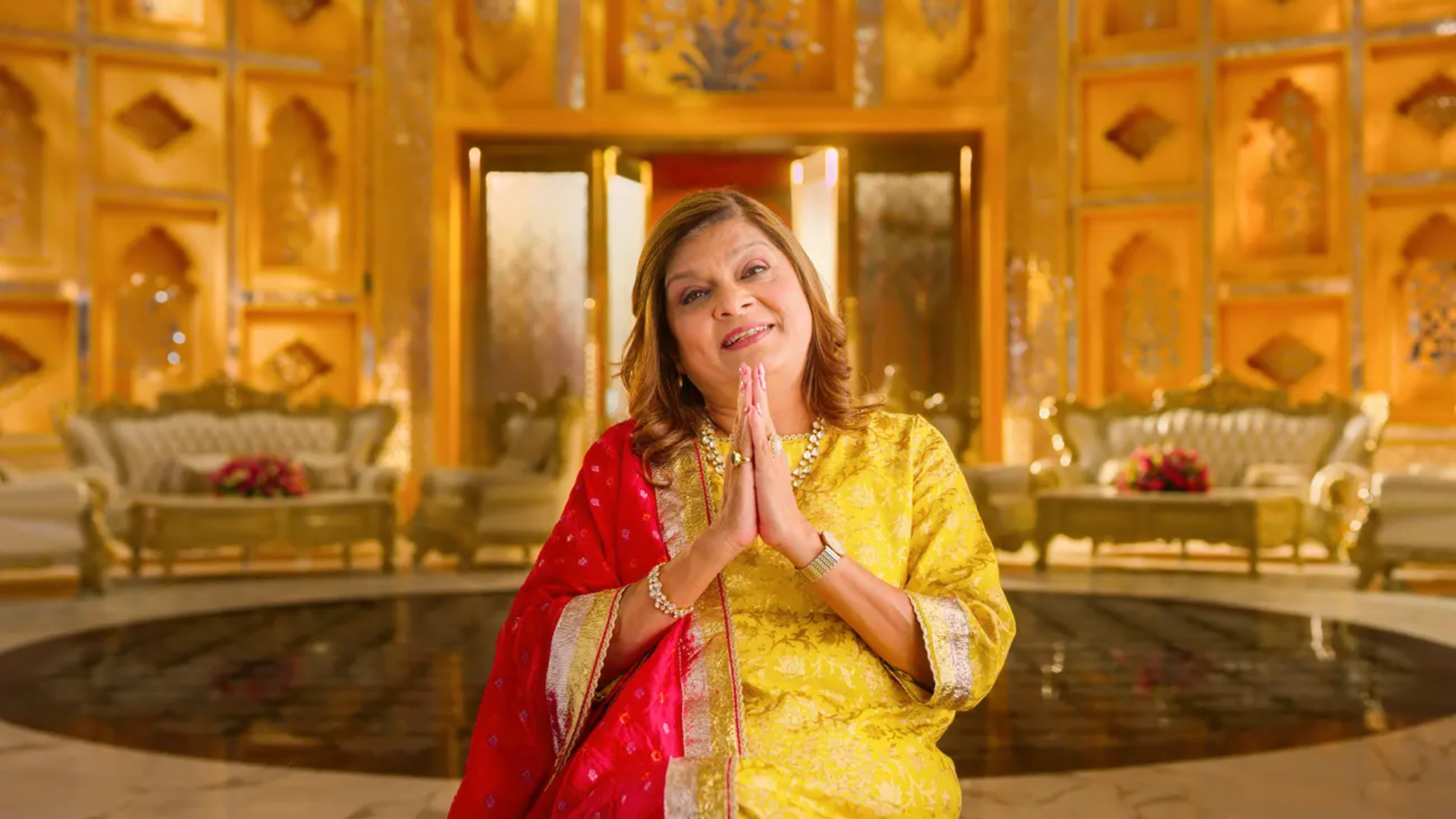


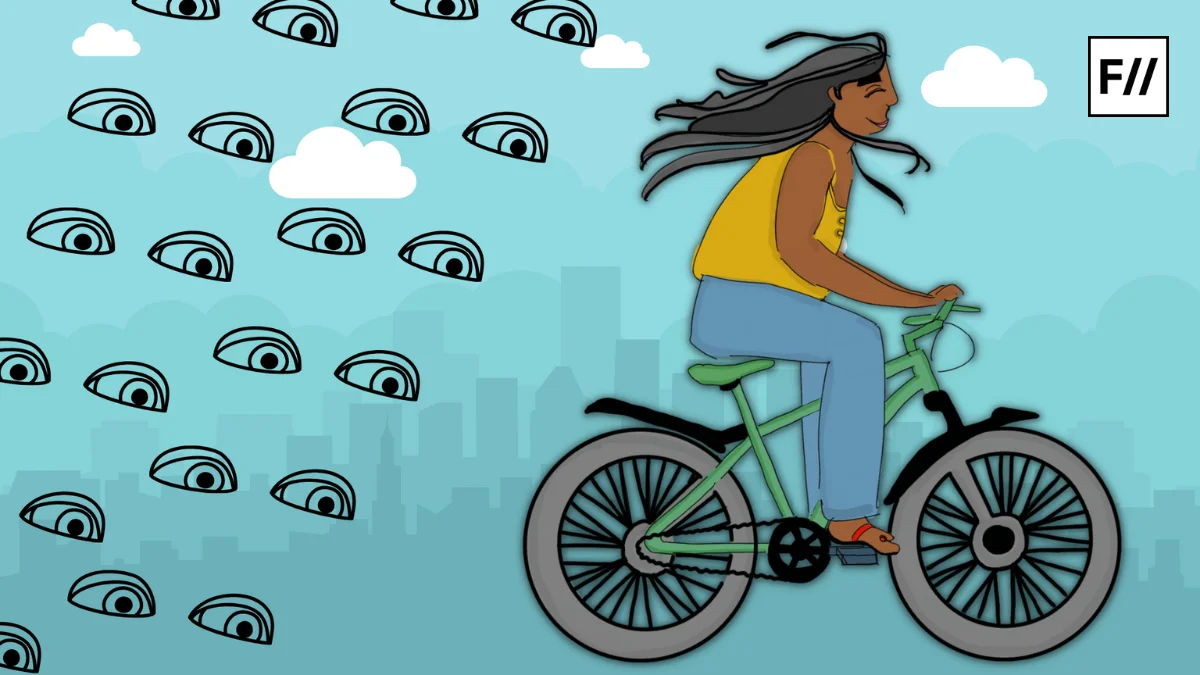
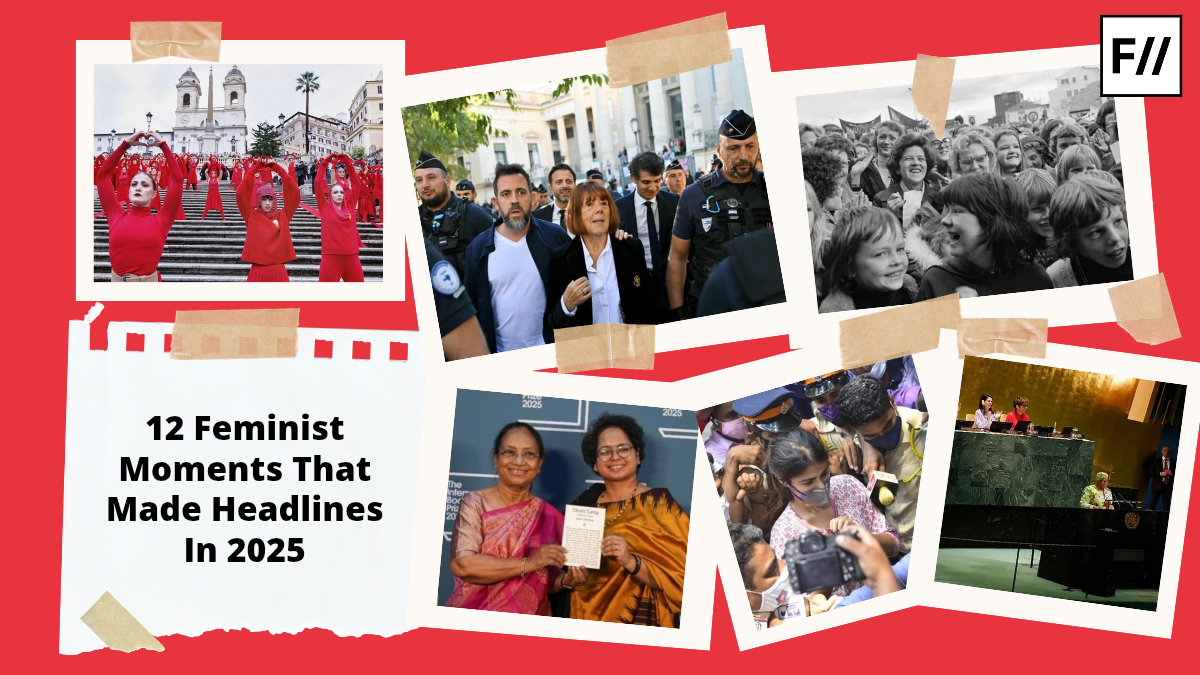

All matrimonials want men earning a six figure salary as though they are human wallets. All women and their parents are gold-diggers. A man must have big pockets to even be considered a human being.